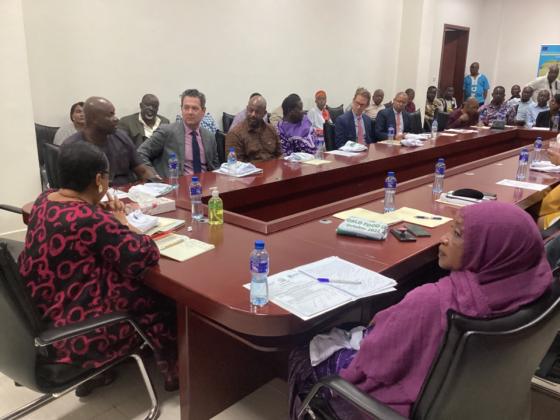Liberia: “Liberia Has Power to Solve Food Security Challenges”

Agriculture Minister Jeanine M. Cooper (far left) addresses an array of development partners during Liberia’s observance of World Food Day 2022.
— USAID Director stresses, as Govt, partners call for collective action
The Russia Ukrainian war, COVID 19, and climate change have posed a very serious effect on agriculture and food security in Liberia. Yet, in spite of these challenges, Liberia’s international partners say they are positive of the country’s ability to shore itself up against any food shortages.
But, the government needs to get its act together, they say.
A recent survey conducted by the government shows that 47% of households (approximately 2.2 million people) are food insecure. The highest levels of food insecurity were reported in Sinoe (67%), Lofa (67%), Maryland (65%), Grand Cape Mount (65%), and Bong (64%) counties. An estimated 8% of households are severely food insecure and at risk of very high acute malnutrition and need urgent attention. Moreover, urban populations are becoming increasingly food insecure (45%), the report said.
Agriculture Minister Jeanine Milly Cooper, speaking during this year's World Food Day program celebration, said that food security improvement is a continuous effort that requires collective action. She added that the government was cognizant of the food security problem facing the country.
According to her, this is why President George M. Weah has now set up the rice stabilization committee to find a way toward the country’s staple food, rice. Liberia recently experienced rice shortage on the local market as a result of the government’s inability to disburse money toward rice import subsidy.
Cooper stated that she was gratified about the continuous commitment of development partners to support the country to reduce hunger.
“Indeed, Liberia can solve its food security problem. There are a lot of commitments from our development partners. I’m glad about the setting up of the task force on rice that will find the way around our rice problem.
World Food Day was celebrated by the government, through the Ministry of Agriculture in collaboration with WFP and FAO, on Wednesday, October 26. Held under the theme, “Safe Food Today for a Healthy Tomorrow”, the celebration took place at the Ministry of Agriculture central office, located at the Ministerial Complex in Congo Town.
The theme implies that producing and consuming safe food can have direct and long-term benefits for people, the planet and the economy.
The Acting USAID Mission Director Rory Donohue, in remarks at the program, said though the U.S Government supports Liberia to improve food security, Liberia in the long term will have to find sustainable solutions to its food problem.
Donohue said that there is no doubt that the country can overcome the challenges of food insecurity.
According to him, Liberia can harness its vast agricultural potential not only to feed itself, but to also drive inclusive economic growth and development. He said that if there is any country that can use agriculture as a springboard for development, it is Liberia.
“I am very pleased to say that in June 2022, the U.S. Government selected Liberia as one of the eight new Feed-the-Future target countries. This means that the United States will support Liberia to develop its agriculture sector and break the vicious cycle of poverty and hunger. But over the long-term, Liberia has to find sustainable solutions to its own food security problem. And let there be no doubt about it; Liberia has the power to solve the food security challenges it faces,” he said.
The United States Government has supported Liberia over the years in the area of agriculture, but gains made have become eroded because of the failures of the Liberian government to sustain the interventions. The country’s agricultural programs continue to depend largely on donor funding and with little impact shown.
The USAID Acting Mission Director said that the task now is to devise the right mix of policies and incentives that can unlock Liberia’s agricultural potential and promote local production of high-value nutritional products.
“There are policy initiatives our Liberian government partners can and should begin to take now to improve agricultural productivity,” Donohue said. “First, Liberia must attract the private sector investment needed to develop the agriculture sector. But to attract investments, the government must end burdensome regulations and protracted approval processes that drive investors away,” he said.
According to him, public officials and regulators must see investors as allies. They should champion policies that encourage competition and reward innovation.
“We must all increase our support for local farmers and agri-entrepreneurs. They need access to tools, inputs, and capital to increase their yields and profits,” he added.
Also speaking, the World Food Program Country Director, Alieu Diongue, who delivered a special message from the Director of the World Food Program, David Beasley, said: “We are facing an unprecedented global food crisis and all signs suggest we have not yet seen the worst. For the last three years, hunger numbers have repeatedly hit new peaks. Let me be clear: things can and will get worse unless there is a large-scale and coordinated effort to address the root causes of this crisis. We cannot have another year of record hunger.”
For her part, FAO Country Representative Director, Mariatou Njie, said that after more than two years of covid and the Ukrainian war ,the number of hungry people and food insecure people continue to rise.
She said that such a situation is seriously affecting the Liberian economy, which requires the political will of the government to take action.
“We need to ensure that the supply of food is on the market and make sure that inputs reach more smallholder farmers. By providing timely information about food prices on the market are some of the things that FAO is working on,” she said.
